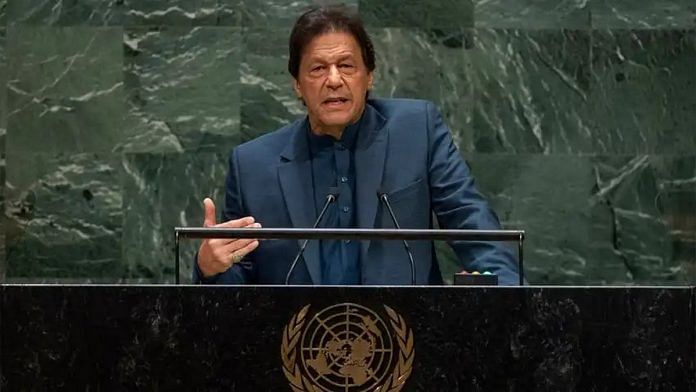New Delhi: Pakistan Prime Minister Imran Khan met traders and leaders of business chambers to make an important plea — Pay your taxes.
Khan spoke to the leaders Monday and requested them to pay their due taxes, after his government last month fulfilled the demands of traders who had sought reduced tax rates and fewer restrictions to register as sales tax persons.
During his meetings with the leaders, Khan promised to waive the registration fee for 100 small businesses and also directed to abolish around 150 licences required for small shopkeepers and businessmen.
Urging the community to pay taxes, Khan said: “When leaders live lavishly on public expense, who will pay taxes?”
“We reduced the expenses of the Prime Minister House by 40 per cent. I live in my own home, pay my own expenses. My salary is not enough to fulfill my own household expenses,” the prime minister added.
During the meetings, the business leaders put forward their demands, including reduction of interest rates from the current 13.25 per cent to a single digit and reduction of energy prices. Khan, however, said his government was not in a position to fulfill their demands.
Also read: At Lahore ThinkFest, Pakistan science minister Fawad Chaudhry justifies slapping TV anchor
Anti-terrorism court’s jurisdiction now in Zainab bill
On 10 January, Pakistan’s lower house, the National Assembly, passed the Zainab Alert, Response and Recovery Bill, aimed at “raising alert, response and recovery of missing and abducted children”.
The bill was named after six-year-old Zainab, who was kidnapped, raped and murdered in 2018. Initially, the bill was meant to be applied only in Islamabad with a death penalty.
On Monday, however, a Senate Functional Committee on Human Rights decided to include the jurisdiction of anti-terrorism courts (ATC) in the bill so that it can be implemented across the country and not just in Islamabad.
The Zainab bill mandates that investigation into cases of kidnapping, rape and murder of children be done within three months.
Provinces can now include mother languages in school syllabus
Pakistan’s provinces will now be able to incorporate regional languages in the school curriculum, even as a mode of instruction, if they desire.
The National Curriculum Committee Monday decided that the provinces ought to be allowed to teach in “mother languages” from Classes Pre-I to V.
A previous draft of the ‘Single National Curriculum’ had decided that technical subjects such as science and mathematics be taught in English from Classes Pre-I to XII as “later the terminologies used in them could be difficult for students”.
With greater leeway to teach in regional languages, the committee hopes to include more diversity in the curriculum, particularly in the study of religion.
Quoting an official, a Dawn report said Punjab, KP, Gilgit-Baltistan and Balochistan could use their native language, as Sindh was using Sindhi.
Giving drug-addicts a makeover
Students from Peshawar’s Institute of Management Sciences (IMScience) teamed up with the country’s Anti-Narcotics Force to initiate a drive to provide drug-addicts with clean clothes, medical care and haircuts, besides advising them on how to start their lives afresh.
The students were members of an NGO called IM Volunteer that conducts the drive annually.
“In 2019, we provided health facilities to approximately 100 drug addicts, out of which 40 people were able to break away from their addiction and resume a normal lifestyle,” said the NGO’s chairperson Shahzad Haneef.
Peshawar and Khyber Pakhtunkhwa are said to be worst hit by drug addiction.
There is no data on drug-affected people with the Pakistani government and the last official record comes from the United Nations Office on Drugs and Crimes survey in 2013, said Haneef.
Also read: 7 Pakistani journalists killed, 60 booked under anti-terror & other laws in 2019: Report



